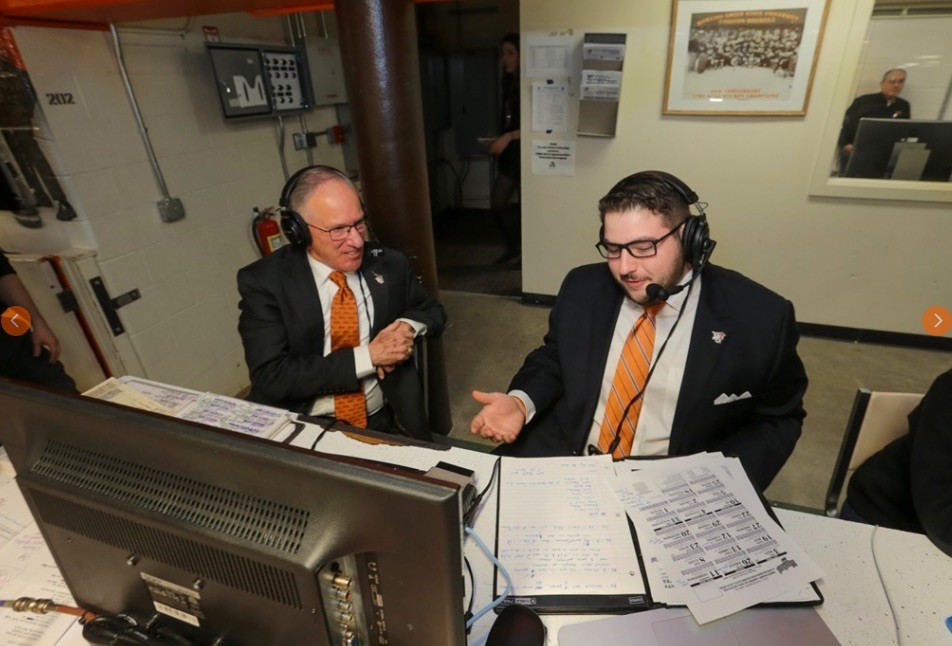OHS grad calls game with legend ‘Doc’ Emrick
When Oceanside High School graduate Evan Pivnick received a text from Bowling Green State University’s assistant athletics director for communications, it seemed unusually stern and concise. Pivnick, the student play-by-play announcer, was told to meet with the assistant A.D. at 2 p.m.
“I’m like, Uh oh, because I thought we’re probably having a talk about my job or the future of my job,” said Pivnick, a senior at the Ohio school, who has called Falcons games for the last three seasons.
Pivnick, a media and production studies major, was relieved when his boss, Jason Knavel, simply wanted to discuss plans for the Bowling Green ice arena’s 50th anniversary game. University alumni would be attending the Feb. 11 matchup with Mercyhurst University, and Knavel wanted Pivnick to share the broadcast booth with one of them.
The options excited Pivnick as he thought of the possible alumni: Hockey Hall of Fame defensemen Rob Blake; Ken Morrow, who played on the 1980 U.S. Olympic hockey team; and retired forward Mark Wells, who also competed on the gold-medal-winning team that beat the Soviet Union. But none of his guesses were correct.
“He turned his desktop computer around, and it’s a photo of Doc Emrick,” Pivnick said.
Mike Emrick, who got the nickname “Doc” during his time at Bowling Green, where he received a Ph.D. in communications in 1976, is the lead announcer for national NHL telecasts on NBC and NBC Sports. A broadcasting legend, he won four Emmy Awards in the last decade for his play-by-play commentary, the first hockey announcer to win one.
“He had two Go Pros set up in that room trying to get my reaction ...,” Pivnick said of Knavel, “and the first thing that came out of my mouth was, ‘Jason, how long have you had that photo on your desktop?’”
The reality that he would be sitting alongside Emrick soon sank in. “Every big hockey event over the last 25 or 30 years, his voice has been there,” Pivnick said. “Every big moment is synonymous with his voice.”
Pivnick grew up in Oceanside. His father, Phil, who announced minor league baseball games in Albany in the mid-1980s, emphasized the art to him from a young age. An Islanders fan with easy access to the Nassau Coliseum, Pivnick fell in love with hockey. He was involved in Oceanside High School’s broadcasting class, and announced a game at Long Beach Ice Arena that was later televised on MSG Varsity.
After a year at Nassau Community College, where he hosted a sports show on the school’s radio station, he wanted to transfer. “When we were looking up colleges and we saw Bowling Green,” his father said, “I showed him the website, and the first thing he did was look up [and say], ‘Oh, Mike Emrick went there! It’s got to be great.’”
Fast-forward to Feb. 11, and the second period of the Falcons’ home game against Mercyhurst was under way. Emrick, who agreed to be Pivnick’s color commentator for the first and third periods, was ready for his 20 minutes of play-by-play.
Pivnick said he almost took his headset off to laugh, as he realized how amazing this opportunity was. He added that Emrick’s ability to eloquently describe the game’s action — this time for radio — was on full display. “He used all of his adjectives because … he never repeats the same word when it comes to passing the puck — he knifes, he spears it, he pitchforks it,” Pivnick said. “He makes everything exciting. Even a non-conference college hockey game.”
Emrick even unleashed his signature goal call, as radio listeners heard “He scores!” blare through their speakers.
“It was scoreless,” Emrick wrote to the Herald in an email. “I got the mic in the second, for my traditional second period, and WE scored twice! I was plus-2! Well, actually one was a power play goal … so technically plus-1!”
Emrick said that visiting Bowling Green was a good experience, but it made him nervous — although a different kind of nervous than when he called his first Falcons game in November 1971. “The nervousness this game was not working with Evan,” he wrote. “It was wanting to hold up my end of the bargain of delivering the game to the audience he and the station had built. And . . . in national network games, it’s not something I can ever say . . . but the best part is . . . WE WON!!!”
Pivnick said he thought it was a prank when Emrick texted him more than a month before the game, wanting to go over pronunciations of the players’ names. From then on, they spoke on the phone, had dinner a few days prior to the game and attended Bowling Green’s practice together the day before.
Emrick walked around the locker room, speaking with each player, Pivnick said, which he taught him a valuable lesson about the importance of preparing for a broadcast. The legend came to the game with ample notes.
“He told me, ‘There’s 90 percent of stuff that I don’t even use on broadcast,’” Pivnick said. “‘I just have it. It’s not the worst thing in the world to have extra information.’”
Emrick said that Pivnick has a “terrific delivery,” and that he has gained more experience at Bowling Green than he, Emrick, had in the ‘70s. He added that working with Pivnick reminded him of the excitement a commentator feels after following a team closely over a span of years.
Part of that thrill for Pivnick, though, did not come from the action on the ice. It came from the opportunity to work with the person beside him in the booth. “It’s like playing on the same line as Wayne Gretsky for a game,” Pivnick said. “It’s a totally unique experience and it’s unbelievable and something I won’t ever forget.”






